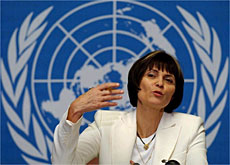Media wary of military propaganda

Newspaper, radio and television journalists in Switzerland are questioning how they can cover a new Gulf War both accurately and objectively.
Analysts claim the Swiss media failed to cover events in Iraq in 1991 with a critical enough eye.
The previous Gulf War left a bitter aftertaste in the mouths of both the Swiss and European media.
Journalists say that they have never felt so manipulated as during the 1991 conflict. They admit they were guilty of processing too much information from the American military propaganda machine.
“The Pentagon and CNN controlled and filtered all the news. Swiss and European television had to content themselves with inviting a few guests into the studio to comment on the American pictures,” recalled Peter Glotz, Professor of Communications at St Gallen University.
Twelve years on, and faced with another war in Iraq, the Swiss media are trying to ensure they don’t fall into the same trap again.
Hysteria
The Gulf War broke out just two years after the fall of the Berlin Wall at a time when hopes of freedom and transparency had been raised, including in the media.
Instead, news coverage of Desert Storm was dictated by high levels of censorship and media manipulation in which it was practically impossible to know what was really going on.
“The American authorities learned from the lessons of the Vietnam war: no need to show the population images of the dead and injured, but rather show them bombs which strike the intended objectives,” Glotz told swissinfo.
“In addition to the Vietnam syndrome, in 1991 there was also a general hysteria about the need for quick information on the part of the media.
“This illusion was fostered in particular by the birth of rolling television news networks, like CNN,” said Jean-Jacques Roth, chief reporter at “Le Temps”.
Useful experience
“This time, the media is certainly much better prepared to avoid such pitfalls. But the American authorities will also probably act in a much more subtle way, leaving most of the work to the journalists but still controlling everything,” added Roth.
The Zurich-based “Tages-Anzeiger” newspaper says it has already taken steps to ensure its war coverage remains balanced.
“We rejected the offer to accompany American troops which will go from Kuwait into Iraq. We don’t want to become cheap instruments of propaganda,” said the paper’s editor, Peter Fürst.
Fürst, who covered the war in Bosnia, says journalists need to remain objective.
“The Balkans War served mostly to show journalists how to distinguish between reality and news coming not only from the warring parties but also from the agencies and the television networks,” he added.
The “Neue Zürcher Zeitung” newspaper is also making a point of checking out news sources.
“We ask our Middle East correspondents in particular to carry out a lot of evaluation work, taking into consideration the sources,” said Jürg Bischoff, a NZZ writer.
Few alternatives
Once again the main problem for reporters will be how to find alternative, but reliable, sources of information.
“On the Iraqi side, the manipulation will be even worse,” said Roth.
“We still don’t even know what exactly happened 12 years go. It’s in neither party’s interest to let it be known.”
Not even the critical position assumed by several European countries nor the advent of new television stations such as al-Jazeera, which is followed closely by the Swiss media, will be able to overcome the problem,” said Roth.
“These new elements will perhaps allow us to have more opinion, but not more information.”
With this in mind, the Swiss media intends to adopt a more rigorous approach to the presentation of information. “Le Temps”, for example, aims, as far as it is possible, to indicate the value and reliability of information to its readers.
Frontline TV
These journalistic rules are perhaps even more important for the Swiss television stations of the Swiss Broadcasting Corporation.
Television networks provide the images of war, which are often more emotive than written or oral information.
“We effectively find ourselves on the front line, with an even greater responsibility,” explained André Crettenand, head of news programmes at TSR, in the French-speaking part of the country.
“We have decided to systematically indicate the source of transmissions and to actively look for different pictures taken from television in the Arab world.”
But 12 years on, Swiss television networks will still be reliant on the mass of information pouring out of the American news machine.
By insisting on fastidious research and well-sourced information rather than “quick news”, they hope to implement a better strategy than in 1991.
swissinfo, Armando Mombelli (translation: Isobel Johnson)
Journalists in Switzerland are questioning how they can cover a new Gulf War.
Analysts claim the Swiss media weren’t critical enough in their coverage of events in Iraq in 1991.
Journalists admit they have never felt so manipulated as during that conflict, and say they were guilty of processing too much information from the American military propaganda machine.
The Swiss media intend to adopt a more rigorous approach to the presentation of information.

In compliance with the JTI standards
More: SWI swissinfo.ch certified by the Journalism Trust Initiative












You can find an overview of ongoing debates with our journalists here . Please join us!
If you want to start a conversation about a topic raised in this article or want to report factual errors, email us at english@swissinfo.ch.